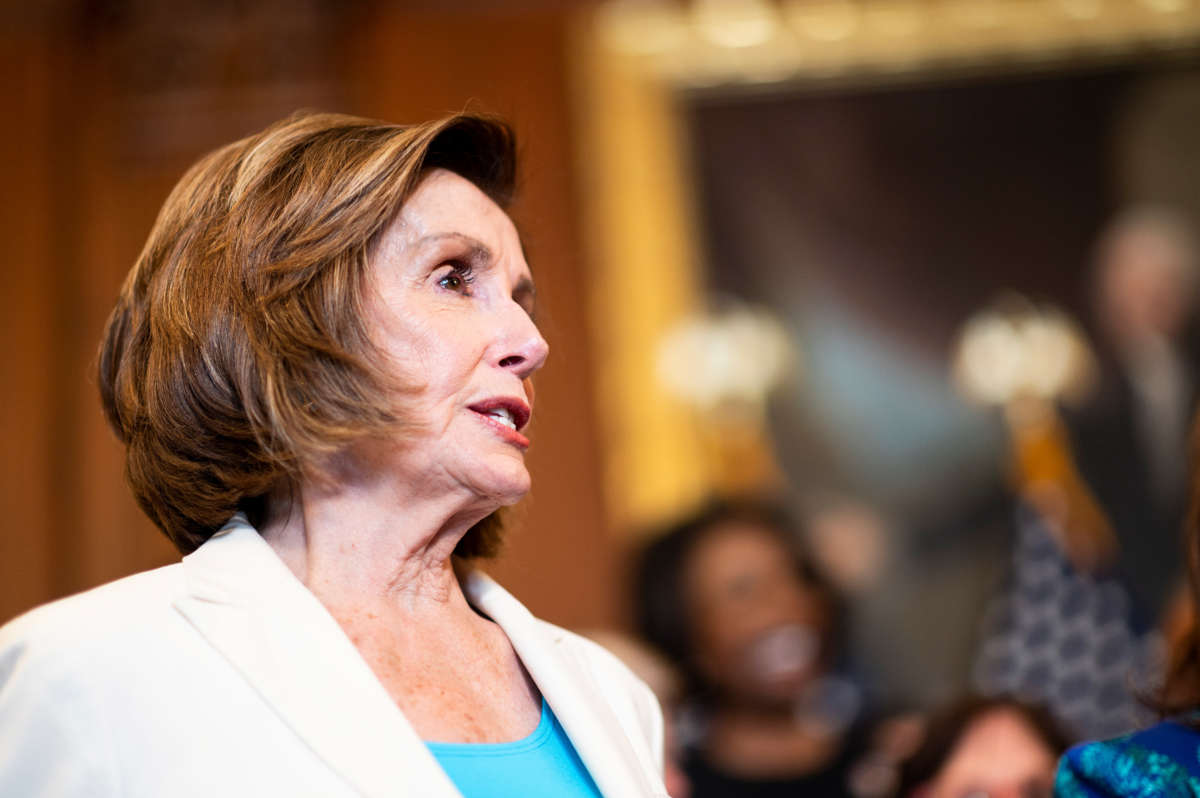Support justice-driven, accurate and transparent news — make a quick donation to Truthout today!
Speaker of the House Nancy Pelosi announced on Thursday that the commission set to investigate what led up to the attack on the United States Capitol building on January 6 would move forward, with or without the cooperation of House Minority Leader Kevin McCarthy.
Pelosi described the investigation into the attack on the Capitol building, which occurred following weeks of former President Donald Trump making false claims that there was fraud involved in the 2020 election, as “deadly serious” work. Trump told his loyalists to go directly to the Capitol in a rally preceding the attack on January 6.
But McCarthy has threatened to not take part in the investigation process. Per the rules established in the formation of the commission, McCarthy is allowed to name five members to serve on the committee, with consultation and approval from Pelosi. Among the five members McCarthy named, Pelosi rejected two of them, Reps. Jim Jordan and Jim Banks — two staunch supporters of former President Donald Trump who voted against certifying the 2020 presidential race on the same day as the Capitol attack, one of whom has wrongly suggested that Pelosi herself was responsible for the violence on January 6.
In response to the speaker rejecting two of his picks, McCarthy withdrew the remaining three members he had chosen (who Pelosi had accepted) out of protest, calling her decision an “egregious abuse of power.” He also threatened to remove himself and Republicans from the process altogether, unless Pelosi acquiesces to letting those picks serve on the commission.
The speaker defended her choice to remove the two Republicans.
Jordan and Banks, Pelosi explained to reporters on Thursday, “had made statements and taken actions that I think would impact the integrity of the Committee, the work of the Committee.”
Pelosi further explained, “It’s about our Constitution, our country. It’s about an assault on the Capitol that’s being mischaracterized for some reason at the expense, at the expense of finding the truth for the American people.”
The speaker affirmed that Republican opposition would not prevent her from moving the commission forward.
“It is my responsibility as the speaker of the House to make sure we get to the truth of this,” Pelosi added, “and we will not let their antics stand in the way of that.”
Pelosi has the power to add more Republican members to the committee if the Minority Leader chooses not to take part. Some Democrats say that doing so may give the commission more weight and an appearance of bipartisanship when it makes its final findings.
Most voters in the U.S. seem to agree on the need to form a commission. A recent CBS News/YouGov poll published this week shows that 72 percent of Americans believe there is more to be learned about when it comes to how the attacks transpired on January 6. Just 28 percent disagree, saying we already know all there is to know about the attacks.
Republicans’ reticence to examine the Capitol attack may be linked to the fact that most Americans also believe that they and Trump were both at least partially responsible for what transpired. A Morning Consult poll from late June found that 61 percent of Americans believed Trump was responsible for the events on January 6, while 50 percent of respondents in the poll said Republicans were also responsible.
A terrifying moment. We appeal for your support.
In the last weeks, we have witnessed an authoritarian assault on communities in Minnesota and across the nation.
The need for truthful, grassroots reporting is urgent at this cataclysmic historical moment. Yet, Trump-aligned billionaires and other allies have taken over many legacy media outlets — the culmination of a decades-long campaign to place control of the narrative into the hands of the political right.
We refuse to let Trump’s blatant propaganda machine go unchecked. Untethered to corporate ownership or advertisers, Truthout remains fearless in our reporting and our determination to use journalism as a tool for justice.
But we need your help just to fund our basic expenses. Over 80 percent of Truthout’s funding comes from small individual donations from our community of readers, and over a third of our total budget is supported by recurring monthly donors.
Truthout’s fundraiser ended last night, and we fell just short of our goal. But your support still matters immensely. Whether you can make a small monthly donation or a larger one-time gift, Truthout only works with your help.
